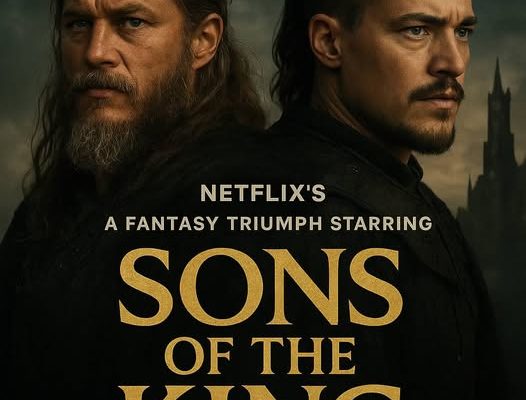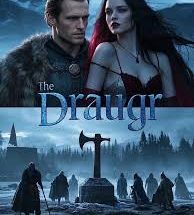From the moment the trailer for Sons of the King landed, it became clear that Netflix is staking bold ground in the fantasy realm. The series presents sweeping vistas, ancient lineages, magic and power struggles — all anchored by the muscular star power of Travis Fimmel and Alexander Dreymon, two actors whose presence demands attention. Where so many fantasy shows drift into formula or rely purely on spectacle, this one appears to aim for something more textured: character, mythology, and high stakes.
Travis Fimmel, perhaps best known for his towering physicality and imposing intensity, brings an aura of warrior‑royalty to this story. He has, in previous roles, embodied figures both epic and feral, and here he appears poised to channel a kind of kingliness that isn’t simply born but earned. Alexander Dreymon, meanwhile, has played resourceful protagonists in period or fantasy‑adjacent worlds, and his casting here promises a balance of steely resolve with emotional depth. Together they form an axis of conflict and alliance, ambition and legacy. That axis is the heart of what the series is promising: not just battles and spells, but the collision of bloodlines, loyalties, and the question of what it truly means to ascend.
Visually, the trailer suggests a world built with serious craft. We glimpse towering halls, mountain strongholds, mist‑covered forests, flickering torchlight in throne rooms, and sweeping cavalry charges. The palette leans dark and weighty, with hints of mythic grandeur: think ancient relics, ancestral swords, long shadows and the flicker of magic in hidden places. It’s as if the creators are saying: “We know the fantasy genre has been done. Now watch us raise the bar.” There is the sense of lineage to classic epic fantasy — echoes of Tolkien, echoes of medieval saga — but re‑imagined with modern production values and a streaming‑era ambition.
What feels particularly strong about Sons of the King is its sense of stakes and scope. The title itself suggests more than just a battle for the crown — it suggests inheritance, rivalry, perhaps betrayal. “Sons” hints at more than one protagonist, more than one claim. The corridors of power, the rival houses, the ancient pacts — all of these suggest a story with many moving parts. The trailer teases betrayals, dark magics, hidden alliances. We see moments of tenderness, of regret, of rage. That variety of tone lifts it beyond mere spectacle and into the realm of human story — albeit a human story played out on a fantastical stage.
One of the promises of this series is that it isn’t simply fantasy for fantasy’s sake. The trailer teases character arcs: a warrior haunted by the past, a younger figure unsure of his claim, an old regime crumbling, a new one arising. You sense that each character bears burdens, legacies, wounds. That’s the terrain where fantasy can really shine: when the magic and myth reflect the internal struggles of the characters. And with Fimmel and Dreymon in the lead, there is reason to believe the series will lean into these internal tensions rather than simply delivering big‑budget set‑pieces.
For fans of the genre, Sons of the King arrives at a fruitful moment. Fantasy television has matured: viewers expect more nuance, more layered storytelling, more believable characters even within unreal worlds. They expect world‑building with coherence, stakes that matter, and emotional pay‑off. This series appears to be designed to meet that expectation. Netflix has increasingly shown willingness to invest in bold fantasy — and this feels like one of those big bets. The trailer’s release sets the stage, but what matters is whether the series can deliver on the promise: political intrigue, epic battles, strained loyalties, ancient magics, all woven into characters you care about.
One of the intriguing dynamics is the pairing of Fimmel and Dreymon. On one hand, you have the older stalwart — the king, the warrior who’s seen too much, who may guard secrets. On the other, you have the younger contender or heir, hungry, idealistic, perhaps reckless. That tension offers fertile dramatic ground: will the older king mentor the younger? Will he fear the younger? Will they be allies or adversaries? Will the heir rebel? These kinds of tensions drive great fantasy dramas because they mirror real human conflicts of power, legacy, generational change. Moreover, the visuals and tone of the trailer suggest the story won’t shy away from darkness: we glimpse moments of pain, of betrayal, of sacrifice. Fantasy is at its best when the myth resonates with the stakes of being human, and when the enemies are internal as well as external.
For viewers, the appeal of Sons of the King is multiple. If you’re drawn to sweeping world‑building: you’ll find it here. If you love intense characters: there’s promise of that too. If you want a fantasy series that doesn’t stop at spectacle but asks questions about power, inheritance, loyalty, change — then this could be one to watch. For die‑hard fantasy fans, the trailer signals that Netflix might have another flagship on its hands. For more casual viewers, the star power of Fimmel and Dreymon may serve as the entry point into a new world. Either way, the series looks ready to engage.
Of course, trailers can only show so much. The real test will be in execution: how many episodes? how well paced? how deep the characters become? will the world‑building hold together? will the stakes be maintained? Will the visual splendour be matched by narrative weight? The early signs are good: the ambition is there, the talent is there, and the trailer has done its job by generating excitement and curiosity. The question now is: will Sons of the King live up to this moment?
One of the subtler strengths of the trailer is its hint of mythology. We sense that the world has depth — relics of past wars, magic that is rare but potent, alliances forged centuries ago. That underlying myth‑history gives fantasy its richness: the sense that you are stepping into a world where the present is haunted by the past, and the future is uncertain. When that mythic layer is done well, the series becomes immersive. And for Netflix, whose global audience expects both spectacle and substance, such a mythic layer is key to standing out among the many offerings.
Another dimension worth noting is the global reach. Netflix releases travel across borders, cultures, languages, so a luxury fantasy production needs to feel both specific and universal. From what the trailer suggests, Sons of the King may hit that mark: enough of the familiar (kingdoms, heirs, battles) to keep grounded, but enough fresh world‑building to feel distinct. For audiences in Nigeria (and globally), where you’re used to sweeping stories and vivid characters in Nollywood, a series like this brings a comparable scale in the streaming fantasy arena — a compelling proposition.
Additionally, the marketing‑moment matters. Releasing the trailer now positions Sons of the King as a highlight of the streaming calendar. It invites viewers to anticipate, to speculate, to pick favourite characters, to imagine alliances and betrayals. That fan‑engagement is part of what makes modern series succeed: it’s not just the show but the engagement, the discussion, the theories. With two high‑profile leads, a rich visual palette, and a genre hungry for fresh big‑budget entries, Sons of the King checks many boxes.
What might viewers hope for? Ideally: a season length that allows characters room to breathe; writing that spends time on relationships, not just action; a world that feels lived‑in; stakes that escalate; surprises that feel earned. The world‑building should avoid the pitfall of too much exposition early on, and instead show the world through characters’ interactions. Visuals should serve story, not overshadow it. And most importantly, by the end of the season, viewers should feel they’ve been taken somewhere meaningful — not just through a series of battles, but through an arc of change.
In summary, Sons of the King is shaping up as a fantasy triumph in the making. The trailer sets a high bar: epic visuals, ambitious world‑building, intense characters, and a star pairing that elevates the material. If executed well, this could be one of Netflix’s standout original fantasy series — a show that competes not just within streaming but in the broader fantasy landscape. For fans of the genre and for those looking for compelling streaming choices, this is one to put on the radar. As the release draws nearer, the big question will be: does the series deliver on the promise? Based on what we’ve seen so far, there is reason to believe that yes — this might just be a fantasy series worth believing in.



